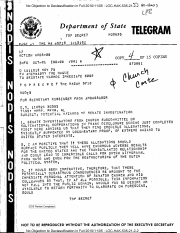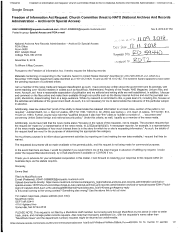Church Committee threat to NATO (National Archives And Records Administration – Archival Or Special Access)
| Multi Request | Church Committee threat to NATO |
| Submitted | Nov. 6, 2018 |
MuckRock users can file, duplicate, track, and share public records requests like this one. Learn more.
Communications
From: Emma Best
To Whom It May Concern:
Pursuant to the Freedom of Information Act, I hereby request the following records:
Materials mentioning or responding to the "extreme hazard to United States interests" described in LOC-HAK-535-21-2-2, which is a November 1975 State Department cable identified as 0 101121Z NOV 75 and as 05715 101218Z. The extreme hazard appears to have been the pending exposure of Lockheed bribes.
I am a member of the news media and request classification as such. I have previously written about the government and its activities, with some reaching over 100,000 readers in outlets such as MuckRock, Motherboard, Property of the People, AND Magazine, Unicorn Riot, and more. As such, as I have a reasonable expectation of publication and my editorial and writing skills are well established. In addition, I discuss and comment on the files online and make them available through non-profits such as the library Internet Archive and and the journalist non-profit, MuckRock, disseminating them to a large audience. While my research is not limited to this, a great deal of it, including this, focuses on the activities and attitudes of the government itself. As such, it is not necessary for me to demonstrate the relevance of this particular subject in advance.
Additionally, case law states that “proof of the ability to disseminate the released information to a broad cross- section of the public is not required.” Judicial Watch, Inc. v. Dep’t of Justice, 365 F.3d 1108, 1126 (D.C. Cir. 2004); see Carney v. U.S. Dep’t of Justice, 19 F.3d 807, 814-15 (2d Cir. 1994). Further, courts have held that "qualified because it also had “firm” plans to “publish a number of . . . ‘document sets’” concerning United States foreign and national security policy." Under this criteria, as well, I qualify as a member of the news media.
Additionally, courts have held that the news media status "focuses on the nature of the requester, not its request. The provision requires that the request be “made by” a representative of the news media. Id. § 552(a)(4)(A)(ii)(II). A newspaper reporter, for example, is a representative of the news media regardless of how much interest there is in the story for which he or she is requesting information." As such, the details of the request itself are moot for the purposes of determining the appropriate fee category.
As my primary purpose is to inform about government activities by reporting on it and making the raw data available, I request that fees be waived.
The requested documents will be made available to the general public, and this request is not being made for commercial purposes.
In the event that there are fees, I would be grateful if you would inform me of the total charges in advance of fulfilling my request. I would prefer the request filled electronically, by e-mail attachment if available or CD-ROM if not.
Thank you in advance for your anticipated cooperation in this matter. I look forward to receiving your response to this request within 20 business days, as the statute requires.
Sincerely,
Emma Best
From: National Archives And Records Administration – Archival Or Special Access
This is an automated reply to inform you that National Archives and Records Administration received your e-mail.
If this is a reference request regarding records in the John F. Kennedy Assassination Records Collection, you must contact our Textual Records Reference Division at archives2reference@nara.gov.
If this is a FOIA request, we are currently assessing your FOIA to determine which organization within NARA can best respond. Once your FOIA is properly routed, our goal is to provide you with a reply within 20 working days* that will either resolve your request or inform you of your FOIA case number and the current status. We will contact you at this e-mail address if we require more information in order to proceed.
Thank You.
*According to the FOIA the 20 working days begins when the FOIA is received by the appropriate component of the agency and is calculated excluding Saturdays, Sundays, and legal public holidays.
From: National Archives And Records Administration – Archival Or Special Access
Dear Ms. Best:
This is in response to your November 8, 2018, Freedom of Information Act
request (RD 59440) about Department of State records on the “extreme
hazards to United States interests” noted in a telegram from the U.S.
embassy in The Hague. We received your request on November 16.
You asked for a waiver of the fees normally charged for providing
researchers with copies of archival records. The fee and fee waiver
provisions of the Freedom of Information Act (FOIA), however, do not apply
to archival records. The FOIA fee section states that "Nothing in this
subparagraph shall supersede fees chargeable under a statute specifically
providing for setting the level of fees for particular types of records."
[5 U.S.C. 552(a)(4)(vi)]. Accordingly, the NARA fee statute, 44 U.S.C.
2116(c), and implementing regulations at 36 C.F.R. Part 1258, apply
exclusively to your request, under which the National Archives does not
waive reproduction charges for individual requesters. Our inability to
grant you the requested fee waiver does not constitute a denial for the
purposes of the FOIA.
The primary source for documentation on U.S. foreign policy and events in
various countries is the Department of State central files, part of RG 59:
General Records of the Department of State. More detail is at:
https://www.archives.gov/research/foreign-policy/state-dept/rg-59-central-files
.
On July 1, 1973, the Department began phasing in a new filing system
referred to as the Central Foreign Policy File. In the new system, records
were no longer arranged by subject in paper files. Documents were indexed
using an automated tool with most telegrams being stored electronically and
hard-copy documents (beginning January 1, 1974) being stored on microfilm.
You may gain access to the declassified electronic telegrams, index
information about the microfilmed documents, and limited information about
still-restricted telegrams and index information in the Access to Archival
Databases (AAD) on the NARA website at <https://aad.archives.gov/aad/>
under “Diplomatic Records.” The National Archives has accessioned these
records through 1979. PLEASE BE SURE TO READ THE ASSOCIATED FAQs BEFORE
BEGINNING USE OF THESE RECORDS. They are found at:
https://www.archives.gov/files/research/foreign-policy/state-dept/rg-59-central-files/faqs.pdf
.
Also in RG 59 are decentralized records of various high level, geographic,
and functional offices of the Department. Those files can be a valuable
supplement to the documentation found in the central files. For important
information about the decentralized files see:
https://www.archives.gov/research/foreign-policy/state-dept/rg-59-decentralized-files.
The following series of records, which have been declassified, may contain
documentation relating to your research:
●RG 59 Entry A1-5403: Records of Henry Kissinger, 1973-77
●RG 59 Entry A1-5177: Transcripts of the Secretary’s Staff Meetings,
1973-1977
●RG 59 Entry A1-5027: Director of Policy Planning Winston Lord, 1969-1977
Finding aids are available in the Archives II research room and in the
on-line catalog.
We will be pleased to make the finding aids and records available in our
research room at the National Archives in College Park, MD. The facility
is located at 8601 Adelphi Road, College Park, MD, near the University of
Maryland--College Park campus.
►Textual Research Room (Room 2000) hours are 8:45 a.m. to 5:45 p.m. Monday
through Friday, except legal holidays.
►Our consultation room hours are 8:45 a.m. to 4:00 p.m. Monday through
Friday, except legal holidays. No appointment is necessary.
►Records are retrieved Monday through Friday for use in the Textual
Research Room at 10:00 a.m., 11:00 a.m., 1:00 p.m., 2:00 p.m., and 3:00
p.m. We do not pull records in advance.
►Prior to your visit, please consult our web sites at
https://www.archives.gov/college-park
https://www.archives.gov/college-park/research
https://www.archives.gov/dc-metro/self-service-copying.html, and
https://www.archives.gov/research/start/getting-started.pdf.
You might also want to contact the Center for Legislative Archives <
legislative.archives@nara.gov>for information about the Church Committee
files.
The Frank Church papers are at Boise State University.
This concludes the processing of your request.
We do not consider this a denial of your FOIA request. However, if you are
not satisfied with our action on this request, your options for appeal and
dispute resolution are as follows:
You have the right to file an administrative appeal in writing via regular
U.S. mail or email. Your appeal should be received within ninety (90)
calendar days from the date of this letter and it should explain why you
believe this response does not meet the requirements of the Freedom of
Information Act. Please address it to the Deputy Archivist of the United
States (ND), National Archives and Records Administration, 8601 Adelphi
Road, College Park, Maryland 20740. Both the letter and the envelope
should be clearly marked “Freedom of Information Act Appeal.” You may also
submit your appeal to FOIA@nara.gov also addressed to the Deputy Archivist.
All correspondence should reference your internal case tracking number
noted above.
In addition to your right to file an administrative appeal with the Deputy
Archivist, you may seek assistance from our FOIA Public Liaison (FPL), Ann
Cummings, Access Coordinator. Contact information for the FOIA Public
Liaison at the National Archives, Washington DC area is as follows:
FOIA requester Service Center telephone number: 301-837-3190
Acting FOIA Public Liaison: Britney Crawford
8601 Adelphi Road, Room 5500
College Park, MD 20740-6001
Telephone number: 301-837-3190
E-mail address: DC.FOIA.LIAISON@NARA.GOV
Finally, the Office of Government Information Services (OGIS) offers
mediation services to resolve disputes between FOIA requesters and Federal
agencies as a non-exclusive alternative to administrative appeals. Using
OGIS services does not affect your right to pursue an administrative
appeal. The contact information for OGIS is as follows:
Office of Government Information Services
National Archives and Records Administration
Room 2510
8601 Adelphi Road
College Park, MD 20740-6001
E-mail: ogis@nara.gov
Telephone: 202-741-5770
Facsimile: 202-741-5769
Toll-free: 1-877-684-6448
Sincerely,
DAVID A. LANGBART
Textual Records Division
National Archives at College Park, MD
david.langbart@nara.gov
www.archives.gov
RDT2 19-08384

